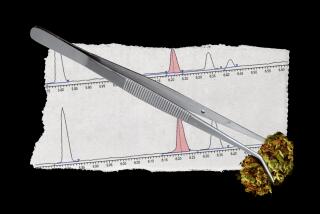Traces of Pesticide Found in Baby Food, Groups Say
More than half the name-brand baby foods selected at random from stores in three cities contained small amounts of pesticide residue that could pose health risks to infants even though the levels are “well below” government limits, a report by two environmental groups said Tuesday.
Sixteen pesticides linked to cancer, neurological problems and reproductive ailments were detected in eight varieties of baby foods from Gerber, Heinz and Beech-Nut, according to the study by the Environmental Working Group and the National Campaign for Pesticide Policy Reform.
The Environmental Protection Agency said Tuesday that there was no need for alarm and that the small levels are not harmful to infants.
Lynn Goldman, an EPA assistant administrator, said the findings accurately reflect the occasional occurrence of minuscule amounts of pesticides in baby food as well as all vegetable and fruit products.
Some of the pesticide levels found in the baby foods were lower than those found in fresh, unprocessed fruits and vegetables.
“I would not recommend that parents stop feeding their children baby food as a result of this,” said Goldman, a former pediatrician.
The environmentalists took 72 samples from vegetable and fruit-based baby foods at grocery stores in Philadelphia, Denver and San Francisco in May. The test focused on eight foods: applesauce, garden vegetables, green beans, peaches, pears, plums, squash and sweet potatoes.
While acknowledging that all the residues met federal health standards, the environmental groups said the standards are not stringent enough to apply to infants and young children.
“I don’t think we should have a food panic,” cautioned Dr. Philip Landrigan, professor of pediatrics at Mount Sinai Medical Center in New York. “I think baby food is very safe, but we have to do better than we’re doing.”
The National Academy of Sciences reported in 1993 that children are more sensitive to pesticide residue on fruits and vegetables than adults are and that the government should better protect them. But at the same time, the academy endorsed a diet for children rich in fruits and vegetables.
More to Read
Sign up for Essential California
The most important California stories and recommendations in your inbox every morning.
You may occasionally receive promotional content from the Los Angeles Times.










